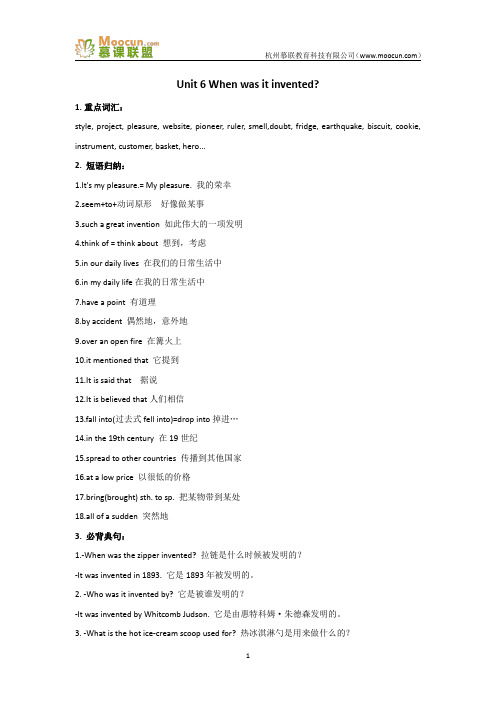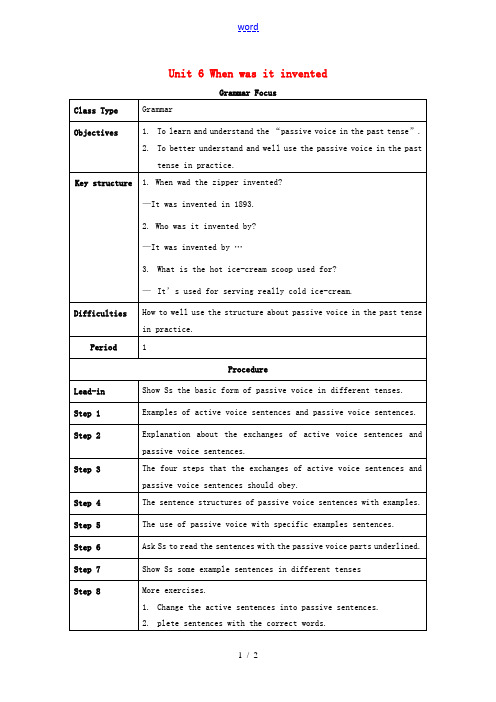九年级英语全册 Unit 6 When was it invented语法小专题习题(含答案)
- 格式:doc
- 大小:30.00 KB
- 文档页数:2


Unit6 When was it invented ?一.短语归纳1.It's my pleasure.= My pleasure. 我的荣幸2.seem+to+动词原形好像做某事3.such a great invention 如此伟大的一项发明4.think of = think about 想到,考虑5.in our daily lives 在我们的日常生活中6.in my daily life在我的日常生活中7.have a point 有道理8.by accident 偶然地,意外地9.over an open fire 在篝火上10.it mentioned that 它提到11.It is said that 据说12.It is believed that人们相信13.fall into(过去式fell into)=drop into掉进… 14.in the 19th century 在19世纪15.spread to other countries 传播到其他国家16.at a low price 以很低的价格17.bring(brought) sth. to sp.把某物带到某处18.all of a sudden 突然地19.less than少于,不到more than = over 超过20.without doubt 毫无疑问21.at that time 在那时22.advise sb (not) to do sth建议某人(不要)做某事23.start doing sth 开始做某事24.work on sth 致力于某事25.(be) similar to 与……相似26.the Olympics 奥运会27.by mistake 错误地,无意地28.make a mistake 犯错29.divide ...into…把…分成… 30.in the end = at last = finally 最后31.at the same time 同时32.teach(taught) sb to do sth 教某人做某事e up with 想出34.encourage sb. to do sth.鼓励某人做某事35.the purpose of ……的目的36.stop sb from doing sth 阻止某人做某事37.look up to sb.钦佩某人38.look up the word 查找单词39.work together 一起工作40.I want to achieve my dream.我想实现梦41.My dream will come true.我的梦想会实现42.work hard 努力工作43.on a hard floor 在坚硬的地板上44.lead to导致leader 领导,引路人45.Don't mention it.不客气,不用谢46.translate...into....把…翻译成…47.be used for doing sth=be used to do sth 48.dream of doing sth 梦想做某事二.用法集萃1. be used to do 被用来做某事be used as 被用作…be used by sb. 被某人使用2.help sb do sth.=help sb. to do sth. 帮助某人做某事3.make a decision to do sth.=decide to do sth.决定做某事4.make sb. + adj. 使某人怎么样make sb do sth使某人做某事be made to do sth 被使唤去做某5..in this way这样,用这种方式三语法全解1.some time 一段时间sometimes 有时some times几次sometime 某个时候2.one of the world's favorite drinks世界最受欢迎的饮料之一.one of …之一,后面的名词用复数(一般要加S),动词用单数(一般要加S);favorite,最喜欢的,前面要用“谁的”.3.thousand千hundred百million百万,当它们前面有数字的时候,它们本身不能加S,当它们后面有of的时候它们要加S,但前面的数字和后面的of不能同时存在4.not…until直到…才,I don…t go to sleep until 11 every day.我每天直到11点才睡觉。

Unit6 When was it invented?短语归纳____________________ 2.偶然;意外地 ________________________________________ 4.想出,想起,考虑_______________考虑____________________ 考虑____________________ 5.落入;陷入____________________ _________________________________ 8.……的本质___________________________________(反:多于_______________) 10.发生;出现;举行___________ 11.……的普及____________________ 12.毫无疑问;的确_____________________________________ 14.把……翻译成……_________________15.突然;猛地___________________ 16.从事;致力于___________________ 17.错误地;无意中______________ 18.想出,提出____________________ ______________ 20.把……分成……________________________________________ 22.阻止……做……____________________23.梦想;向往___________________ 24.不但……而且……__________________25.……的数量____________________ 大量的……____________________26.钦佩;仰慕___________________ ______________________________________ ____________________30.与……类似____________________Section A1.changing the style of the shoes改变鞋的样式style〔名词〕样式;款式the style of... ……的样式out of style 过时in style 流行,时髦The style of the blouse is my mother's favorite.2.—Can you help me think of an invention?你能帮我想个发明吗?—With pleasure!乐意效劳!1) Can you do...?你能做……吗?此句型表示客气地请求某人做某事,其肯定回答一般为“Sure, I'd love/like to./With pleasure.”。

Unit 6 When was it invented?1.重点词汇:style, project, pleasure, website, pioneer, ruler, smell,doubt, fridge, earthquake, biscuit, cookie, instrument, customer, basket, hero...2. 短语归纳:1.It's my pleasure.= My pleasure. 我的荣幸2.seem+to+动词原形好像做某事3.such a great invention 如此伟大的一项发明4.think of = think about 想到,考虑5.in our daily lives 在我们的日常生活中6.in my daily life在我的日常生活中7.have a point 有道理8.by accident 偶然地,意外地9.over an open fire 在篝火上10.it mentioned that 它提到11.It is said that 据说12.It is believed that人们相信13.fall into(过去式fell into)=drop into掉进…14.in the 19th century 在19世纪15.spread to other countries 传播到其他国家16.at a low price 以很低的价格17.bring(brought) sth. to sp. 把某物带到某处18.all of a sudden 突然地3. 必背典句:1.-When was the zipper invented? 拉链是什么时候被发明的?-It was invented in 1893. 它是1893年被发明的。
2. -Who was it invented by? 它是被谁发明的?-It was invented by Whitcomb Judson. 它是由惠特科姆·朱德森发明的。


人教版九年级全一册英语Unit6重点语法知识点总结Unit 6 When was it invented?Section A(1a~2d)_必记单词ⅢⅢ1. heel n.鞋跟;足跟【例句】His heel is raw because his shoe does not fit well. 因鞋子不合适,他的脚后跟擦破皮了。
2. scoop n. 勺;铲子【例句】He used a scoop to scrve the ice cream. 他用铲子来吃冰激凌。
3. electricity n.电;电能【例句】While I was cooking supper, the electricity went off.我正在做晚饭时停电了。
【联想】electrical adj.电的,与电有关的4. style n.样式;款式【例句】The style of this skirt is just in season.这条裙子的款式正当时令。
【搭配】out of style 过时的|| in style 流行;时髦地5. project n.项目;工程【例句】The project is proceeding as planned. 工程正在按计划进行。
【联想】projection n.设计;规划;放映6. pleasure n.高兴;愉快【例句】He didn't show any pleasure when I offered to go withhim.我提出和他一起去,他并没有表示出高兴的样子。
【搭配】pleasure in... 以……为荣‖with pleasure 乐意效劳It's a /my pleasure.不客气。
【注意】pleasure 多用作不可数名词,当做“快乐的事,乐事”解时用作可数名词。
7. zipper n.(=zip) 拉链;拉【例句】The zipper is red.这条拉链是红色的。
Unit6核心必备句型详解1. When was it invented? 它是何时发明的?本句用于询问某个物品的发明时间,结构为“When + was+某项物品+invented?”,其中was invented是一般过去时的被动语态,其基本结构是“was/were + 过去分词”【备课例句】This book was bought yesterday. 这本书是昨天买的。
【横向辐射】几种基本时态的被动语态1.一般现在时:am/is/are +过去分词Football is played all over the world. 足球运动遍及全世界。
2.一般过去时:was/were + 过去分词This book was bought yesterday. 这本书是昨天买的。
3.一般将来时:will be +过去分词The class meeting will be held tomorrow. 班会将在明天开。
4.现在进行时:am/is/are +being +过去分词Our teaching building is being built now. 我们的教学楼正在兴建中。
5.过去进行时:was/were + being +过去分词The bus wasn’t being repaired by me then. 那时这辆车不是由我修的。
6.现在完成时:have/has + been +过去分词The work has been finished by them. 这项工作已经被他们做完了。
【课堂变式】1.We ____not to play computer games.A. are toldB. have toldC. toldD. tell【解析】tell sb. not to do sth.意为“告诉某人不要做某事”,这里的主语we是tell 这个动作的承受者,故应用被动语态,应选A。
Unit 6 When was it invented? 【重点单词】1. project n. 项目,工程;2. pleasure n. 高兴,愉快;3. daily adj. 日常的,每日的;4. mention v. 提到,说到;5. nearly adv.几乎,差不多;6. boil v. 煮沸,烧开;7. remain v. 保持不变;剩余;8. national adj.国家的,民族的;9. low adj.低的,矮的;10. translate v. 翻译;11. lock v.锁上;n. 锁;12. sudden adj. 突然的13. crispy adj. 脆的;酥脆的;14. salty adj. 咸的;15. sour adj. 酸的,有酸味的;16. customer n. 顾客。
17. Canadian 加拿大的,18. divide v. 分开,分散;19. hero n 英雄,男主角;20. professional adj. 职业的,专业的;【重点词组】1. shoes with special heels 特殊后跟的鞋子2. hot ice cream scoop 热的冰其淋勺子3. run on electricity 电动的4. be used for 被用作5. the subject for my school project 学校项目的课题6. our daily lives 我们的日常生活7. have a point 有点道理8. by accident 偶然,意外地9. over the open fire 在火堆上10. fall into the water 落入水中11. take place 发生12. without doubt 毫无疑问13. at a low price 以一个很低的价格14. translate the book into different language 把书翻译成不同种的语言15. all of sudden 突然16. by mistake 错误地17. a much-loved and active sport 一个深受喜爱并且积极的运动18. divide…into 把…分开19. stop sb. from doing sth. 阻止某人做某事20. look up to 钦佩,仰慕21. the professional basketball groups 职业篮球机构22. use someone else’s idea 借用其他人的想法【重点句式】1. I think the TV was invented before the car. 我认为电视是在轿车之前发明的。
人教版英语九年级全册第六单元重点短语、句子及其运用Unit 6 When was it invented?同学们,进入九年级以后,单词、短语、句子的重要性就愈加明显,为了帮助大家更好地学习,我们为大家准备了以下复习资料,希望对你有所帮助。
1、关于before与afterbefore表示“在...以前”,after表示“在...以后”,例如:You have to be back before 10:00 at night. 你必须在晚上十点之前回来。
又如:I think the TV was invented after the car.我认为电视是在汽车之后发明的。
2、When was the telephone invented?是什么时候被发明的?was invented被发明,因“发明”这个动作是发生在过去,用一般过去时的被动语态was + invented。
3、What is it used for? 它被用来做什么?be used for...被用来做...,后面接动词的ing形式。
例如:It is used for scooping the icecream.它杯用来舀冰激凌。
类似的问句还有:What are they used for?它们被用来做什么?They are used for seeing in the dark. 它们被用来照明。
4、Can you help me think of an invention?你能帮助我想一项发明吗?5、You do seem to have a point.你确实好像有点道理。
do一般用于否定句或疑问句中作为助动词,若用于肯定句中,主要用于加强语气,翻译为“的确”、“确实”。
6、The pioneers of different inventions were listed there.各种不同发明的先驱者在那儿被列出来。
were listed被列出来,一般过去时的被动语态。
Unit 6 When was it invented单元语法小专题(Grammar Focus)语法精讲一般过去时的被动语态一般过去时的被动语态表示在过去某一时间发生的被动性动作,由“was/were+及物动词的过去分词”构成。
一般过去时的被动语态的疑问形式是将was/were 提到句首,肯定回答用“Yes,主语+was/were.”;否定回答用“No,主语+wasn't/weren't.”。
一般过去时的被动语态的否定形式是在was/were后加not。
如:All the bananas were eaten up by the two girls.所有的香蕉都被这两个女孩吃光了。
The big square wasn't built in 2008.这个大广场不是在2008年建造的。
—Were lots of trees planted last year? 去年栽了许多树吗?—Yes,they were./No,they weren't.是的,栽了。
/不,没栽。
【拓展】特殊的被动语态1.含有双宾语的被动语态含有双宾语的主动句变被动句时,可以将其中任何一个宾语变为被动结构的主语。
一般是把主动结构中指人的间接宾语变为被动语态的主语,这样句子显得自然;若把指物的宾语变为被动语态的主语,间接宾语前要加介词to,for等。
通常情况下,谓语动词是tell,bring,pass,lend,give,write等时,要在间接宾语前加to;谓语动词是buy,cook,find,make,draw等时,要在间接宾语前加for。
如:He lent me a bike.→ I was lent a bike (by him).→A bike was lent to me (by him).他借给了我一辆自行车。
2.复合宾语的被动语态若主动句为“主语+谓语+宾语+宾补”这种复合宾语结构时,则只能将宾语变为被动结构的主语,宾补变成被动结构的主语补足语。
Unit 6 When was it invented
单元语法小专题(Grammar Focus)
语法精讲
一般过去时的被动语态
一般过去时的被动语态表示在过去某一时间发生的被动性动作,由“was/were+及物动词的过去分词”构成。
一般过去时的被动语态的疑问形式是将was/were 提到句首,肯定回答用“Yes,主语+was/were.”;否定回答用“No,主语+wasn't/weren't.”。
一般过去时的被动语态的否定形式是在was/were后加not。
如:All the bananas were eaten up by the two girls.所有的香蕉都被这两个女孩吃光了。
The big square wasn't built in 2008.这个大广场不是在2008年建造的。
—Were lots of trees planted last year? 去年栽了许多树吗?
—Yes,they were./No,they weren't.是的,栽了。
/不,没栽。
【拓展】特殊的被动语态
1.含有双宾语的被动语态
含有双宾语的主动句变被动句时,可以将其中任何一个宾语变为被动结构的主语。
一般是把主动结构中指人的间接宾语变为被动语态的主语,这样句子显得自然;若把指物的宾语变为被动语态的主语,间接宾语前要加介词to,for等。
通常情况下,谓语动词是tell,bring,pass,lend,give,write等时,要在间接宾语前加to;谓语动词是buy,cook,find,make,draw等时,要在间接宾语前加for。
如:
He lent me a bike.→ I was lent a bike (by him).→A bike was lent to me (by him).他借给了我一辆自行车。
2.复合宾语的被动语态
若主动句为“主语+谓语+宾语+宾补”这种复合宾语结构时,则只能将宾语变为被动结构的主语,宾补变成被动结构的主语补足语。
如:
We call him Xiao Wang.我们叫他小王。
→He is called Xiao Wang.他叫小王。
【注意】若主动语态中的宾补是省略to的不定式,变为被动语态时需把to还原。
如:
They heard her sing a song at the party.→She was heard to sing a song at the party.在晚会上他们听她唱了一首歌。
3.特殊疑问句的被动语态
和主动句一样,仍将疑问词置于句首。
若主动句的疑问词是who,变被动句时要改为by whom置于句首,也可仍用who,而将 by置于句末。
如:
Who bought the book? →Who was the book bought by?/By whom was the book bought? 谁买了这本书?
语法精练
Ⅰ.用括号内所给单词的适当形式填空。
1.My brother went to bed so late because his homework wasn't_finished(not finish) on time.
2.A present was__given(give) to me by my friend on my birthday.
3.He was__seen(see) to swim in Daming Lake yesterday.
4.Annie was__invited(invite) to the party.She had a wonderful time with us.
5.Luckily,no one was__hurt(hurt) in the car accident near the school.
6.Sorry.The book you ask for was__sold(sell) out two days ago.
7.My shoes were__washed(wash) by my mother yesterday.
8.Were a lot of useful things invented(invent) by Edison?
9.The window was__cleaned(clean) ten minutes ago,and the room looks bright now.
10.I can sing the songs.They were__taught(teach) by our English teacher yesterday.
Ⅱ.按要求完成下列句子,每空一词。
11.The bike was produced in 2013.(对画线部分提问)
When was the bike produced?
12.The new machine was made by Tom.(对画线部分提问)
Who was the new machine made by?
13.Did your uncle wash the car yesterday afternoon?(改为被动语态)
Was the car washed by your uncle yesterday afternoon?
14.My brother sent an English letter to me last
Saturday.(改为被动语态)
An English letter was sent to me last Saturday.
15.Yesterday we were asked to clean the classroom by our teacher.(改为主动语态)
Yesterday our teacher asked us to clean the classroom.。